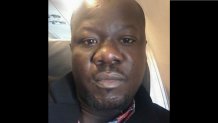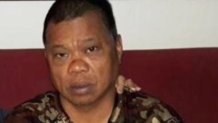Steven Olson, Alfred Olango, Dennis Carolino -- three local men who were experiencing mental health episodes when they were killed by police. The shootings were followed by protests, calling for change and accountability within police departments.
But years after Alfred Olango’s death, his sister, Lucy, is still struggling with the reality that her call to 911 might have ultimately cost him his life. She didn’t know it, but when Olango showed up at her El Cajon apartment on April 27, 2016, it would be his last visit.
Olango learned his best friend had killed himself days before. He was confused and paranoid and thought people were following him.

Get San Diego local news, weather forecasts, sports and lifestyle stories to your inbox. Sign up for NBC San Diego newsletters.
Lucy Olango recalled that moment, “I said ‘what are you scared of? It's just me and you in the house, there is no one else here.’ He said ‘People are following me.’ I said, ‘Who are these people following you?’”
Lucy Olango knew the signs of a person that was in mental distress. For the past 14 years, she has worked as an aide at a lockdown facility where doctors and nurses treat mentally ill patients. She called 911 to report that her brother was mentally unstable. It was the first of three calls she made, pleading for help.
After Lucy Olango called 911 the first time, she started to get ready for work. But suddenly her brother was gone. As Lucy began her drive to work, she said she saw Alfred Olango walking in and out of traffic and across the median on Broadway and Mollison, a busy intersection close to her apartment. She repeatedly tried to persuade him to stop, but he didn’t.
Local
When El Cajon police finally showed up, it was not the help Lucy Olango had hoped for. Her brother was shot four times during a tense encounter with officers, right in front of her.
Lucy Olango cries just thinking about it.
“I just felt so helpless, he was just standing there," she said. "He couldn't process what was going on."
She says she was calling out to the responding officers, “Please don’t kill him, don’t shoot him. Figure a better way to be humane and be passionate!”
The officers thought Olango had a gun. Turned out it was a vape pen.
The shooting of Alfred Olango was among several around the country captured on video that year. His case drew international attention because he was a Ugandan refugee. His shooting brought up the issue of race and how police react to people with psychiatric problems.
Paul Cappitelli worked in law enforcement for over 40 years. He's now a public safety consultant and police practices expert. He reviewed the Olango shooting video with NBC 7 Investigates. Just before he was shot, Olango pulled the vape pen out of his pocket and pointed it at police.
“There are only a few other things someone would do, standing like that in front of a police officer pointing their hand like this, with an object in it that could be construed as having something other than a weapon or a gun at that moment.”
A special police team to respond to mental health calls was on duty that day in El Cajon. But, when Lucy called for help, the Psychiatric Emergency Response Team, known as PERT, was on another call and unavailable to respond.
But Cappitelli says even when PERT is available, they can’t always intervene right away. ”And in that instance, it's not likely that that mental health professional is going to go stand in front of that person who is armed with a gun or who is armed with a knife or a shovel.”
NBC 7 Investigates reviewed policies of several local police departments and found officers are being trained in crisis intervention, including how to de-escalate tense situations.
El Cajon Police tell us they incorporate de-escalation training into their quarterly mandatory department training.
Officers with the San Diego Police Department receive the training at least every 18 months and also have opportunities to take PERT training.
Escondido police officers go through de-escalation training every year.
Cappitelli says he saw Escondido officers using some of those de-escalation techniques on Steven Olson this past April. Police say Olson, who has a history of mental health issues, was the subject of at least 23 radio calls in 2021, for things like trespassing and exhibiting threatening behavior. The officer backed away about 65 feet from Olson before firing several rounds.
“The officer’s choice at the time appeared to be to back up and try the best he could to avoid being close to the suspect, yet the suspect continued to close the distance between them,” Capitelli said.
In 2019, a San Diego police officer shot and killed Dennis Carolino when he ran at officers, wielding a shovel.

Carolino’s aunt had called 911 after he threw a brick at her. She told dispatchers Carolino was in the midst of a psychotic breakdown. Family members say she hasn’t forgiven herself.
“We can't blame her because she did not make a mistake," Carolino’s brother, Anthony said. "She was asking for help, but the help that they gave us is not the help that we need.” He added, “To use deadly force is not an answer.”
While the use of non-lethal weapons is part of officers’ training, Cappitelli says it’s not always effective. “Especially sometimes when people are under the influence and when they’re really amped up, they’re not going to stop immediately when they’re struck with a taser.”
In both the Alfred Olango and Dennis Carolino cases, the San Diego District Attorney's Office found the officers justified in their use of deadly force.
Lucy Olango sued the city of El Cajon and the officer who killed her brother. She lost but is in the process of appealing. Her attorney, Dan Gilleon, said a decision should be made within the next 30 days.
Anthony Carolino has filed a lawsuit against the city of San Diego.
As for the Steven Olson case, the DA’s office will review it once Escondido police finish their internal investigation.



